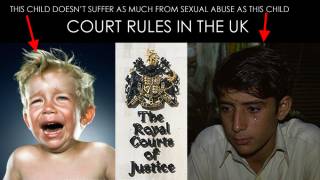We approach others’ children at our peril
Source: timesonline.co.uk
There’s just one element of the stories of my childhood that fascinates my own children. It’s not the absence of mobile phones, or the idea of a world before the internet. It’s the fact that so many of my small crises ended in the same way: with my being rescued by the kind intervention of an unknown man.Whether I was a nine-year-old being kicked to the ground by a gang of girls in the park, a 14-year-old lost in the Welsh hills on a walking holiday or a 12-year-old who had taken a bad fall from a horse and couldn’t ride home, it was adult men who stepped in without hesitation to stop the fighting or give me a lift or bandage my grazed arms.
I might as well be telling my children about life with the Cherokee Indians. This isn’t a world they know, where children expect to explore by themselves and where passing men and women are the people you turn to when things go wrong. Their generation have been taught from the time they start school that all strangers may be dangerous and all men are threats. So children have become frightened of adults, and adults – terrified that any interaction of theirs might be misinterpreted – have become equally frightened of them.
When my offspring and their friends have been mugged on buses, or attacked on the street by teenagers, no one has helped. Every passing adult has looked the other way. The idea that it’s the responsibility of grown-ups to look out for one another’s young is disappearing fast. That isn’t making our children safer. It’s making their lives more fearful, more dangerous and more constrained.
Last week the charity Living Streets reported that half of all five to 10-year-olds have never played in their own streets. Almost nine in 10 of their grandparents had played out and so had many of their parents, but now children were kept inside, imprisoned by the twin fears of traffic and paedophiles. As the Play England organisation has found, parents keep them in because they believe that if they aren’t watching over their child, no other adult will do it for them. Older children, too, are affected. Two years ago research by the Children’s Society showed that 43% of parents thought children shouldn’t be allowed out on their own until they were 14.
What began 25 years or so ago as an understandable desire to raise awareness of child abuse is turning into something extremely destructive – an instinctive suspicion of any encounter between grown-ups and unrelated children. It has happened without any political debate or rational discussion. It’s starting to poison our society. And with every passing month it’s getting worse.
Last month in Bedfordshire, 270 children from four primary schools had their annual sports day without the normal audience of proud parents watching them compete. All adults except teachers were banned. The reason? The organisers could not guarantee that an unsupervised adult might not molest a child. They preferred the certainty of ruining the pleasure of hundreds, and the instilling of general paranoia, to the phenomenally slight possibility of a sexual attack.
This is part of an insidious new orthodoxy that’s taking hold: that only authorised adults have any business engaging with children. It is no longer just about sexual abuse. In Twickenham last month the mother of a five– year-old who was being bullied decided to talk to the offender. She knelt by his chair and asked him politely to stop. The next day she was banned from the classroom for doing something that would have been regarded as rational and responsible behaviour at any other time in the past century.
Much worse was to happen a few days later to Anisa Borsberry, from Tyne and Wear, whose 11-year-old was being bullied by agroup of girls. She, too, asked the bullies to stop. In retaliation, and knowing what a powerful weapon this was to use against an adult, the girls claimed Borsberry had assaulted them. Within hours they admitted lying. Nevertheless, the accusation of assault against a child is regarded as so serious that Borsberry was handcuffed in her home and held in police cells for five hours before hearing that no further action was being taken.
Or there is the case of Carol Hill, the Essex dinner lady threatened with dismissal for telling a mother she was sorry her daughter had been tied up and whipped in the playground. Normal, empathetic human behaviour, you might think. That wasn’t the school’s reaction. Hill was suspended for breaching “pupil confidentiality”.
In every one of these cases a woman has been punished for daring to do what adults have always done in every society: uphold norms of behaviour by talking about them. But it has blown up in their faces because new unwritten rules about engaging with children are apparently being invented every day. The extent of society’s neurosis means the consequences of approaching children are becoming alarmingly unpredictable.
That’s as true for professionals as for anyone else. Traditionally, teachers have been thought of as potential mentors for children or confidants for those in distress. Increasingly they are being warned away from that role and told to keep their distance by schools. Nowhere is that made clearer than in a draft advice guide for teachers issued this spring by the Purcell school for young musicians.
The guide begins by telling staff: “Some adolescents experience periods of profound emotional disturbance and turmoil when they may be unable to differentiate between fantasy and reality. They may even be temporarily insane. They can thus present a danger to even the most careful of teachers.” This is child as wild animal; one that may bite at any moment. Teachers are told not to talk to pupils after coaching sessions, but to “usher them out of the room in a brisk nononsense manner”. They are told never to text pupils from their private mobiles, but to buy a second one for school use. This “should only be used for arranging appointments; chit chat should be avoided”. Nor can a teacher ever be alone with a pupil in a car, except in case of medical emergency, when the child must be seated in the back, a written record made of time, date and place and a telephone call made to the pupil’s parents to justify it.
The guide concludes that these procedures must become second nature, as any child may accuse a teacher and “your accuser could be of unsound mind”. It finishes with this chilling sentence: “It is helpful to think of current pupils as clients, rather than friends, as a doctor does.”
That these norms are taking hold is a sign of a sick society. What we are creating here is mass mutual distrust. First, children were warned about adults; now adults are being warned about children. It is bad for all of us; bad for our humanity, our happiness and our sense of belonging to anything but a narrow, trusted group. It is also disastrous for any hope of improving social mobility or social cohesion. The effects of this coldness and detachment will be worst for those who need adult guidance and contact most: those children who are growing up without strong social networks around them.
The Labour government appears to understand none of these dangers. Obsessed with physical safety, it is bringing in a screening authority this autumn, one that will cover perhaps one in four adults. It won’t acknowledge the psychological and social disaster that’s unfolding now, nor the pointlessness of much of the exercise. Most abuse is, after all, carried out in the home, and determined abusers will always evade the rules. David Cameron has made some of the right noises by saying children’s behaviour should be a matter for all adults. It will take extraordinary determination to dismantle the walls of suspicion that we have begun to build.
Article from: TimesOnline.co.uk
'Sin Bins' For the Worst Families
Brian Gerrish - Common Purpose & Neuro Linguistic Programming
Niki Raapana - The Anti Communitarian League
Priests can't kiss or tickle children, archdiocese says
‘Put CCTV in addicts’ homes to protect children’
Common Purpose (CP)
- a hidden menace in our government and schools






















